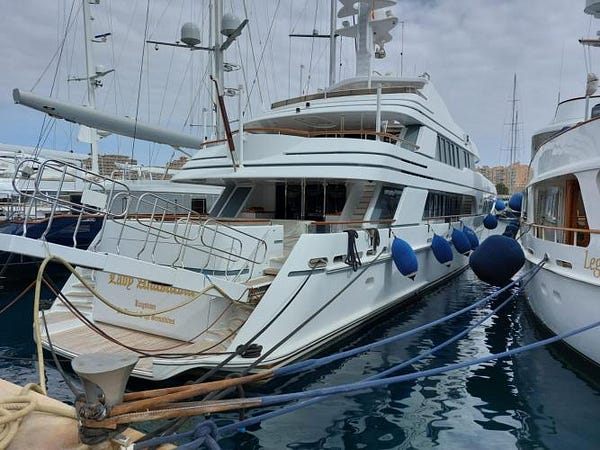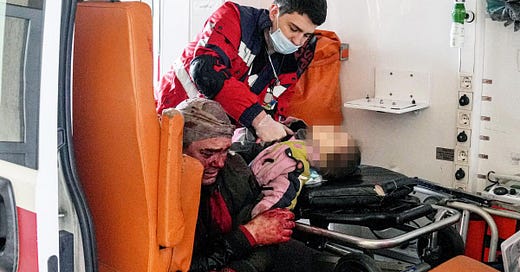Today’s posts that caught my eye:
After a classified briefing, Senate Intelligence Committee Vice Chair Marco Rubio (R-FL) said Putin is laying the groundwork for a “medieval siege” of Kyiv, Political Wire notes
Keep one eye on Hong Kong, where residents are waiting up to 39 hours for ambulance as Covid wreaks havoc on system.
Since its stock peaked in October 2020, Zoom has lost over three-quarters of its value, reports CNBC.
Know someone who should check out the newsletter? Let them!
The World
As a 40-mile-long Russian army convoy nears Kyiv, the war risks forcing more than seven million people to flee their homes, leading to a wave of refugees that would dwarf the 2015 migration crisis, the EU warned. Russia’s invasion is expected to set in motion a population movement unparalleled in Europe since the turmoil that followed WWII, when more than 12 million were displaced. “We are witnessing what could become the largest humanitarian crisis on our European continent in many, many years,” Janez Lenarcic, 54, the EU’s Slovenian crisis management commissioner, said. (The Times)
The 193-member UN General Assembly began meeting on the Ukraine crisis ahead of a vote this week to isolate Russia by deploring its "aggression against Ukraine" and demanding Russian troops stop fighting and withdraw. (Reuters)

Russian forces escalated their bombardment of Kyiv and Kharkiv, killing and maiming dozens of civilians as they sought to conquer their first urban centre in Ukraine. In the UK, Boris Johnson condemned “barbaric Russian airstrikes against innocent civilians.” (The Times)
The invasion brings Russia global repudiation with Cold War echoes: (New York Times)
Airbnb promised to house 100,000 Ukrainian refugees at no charge. Meanwhile, major auto and truck makers have cut off exports to Russia, including Volvo and GM. Shell, BP and Norway's Equinor said they would exit positions in energy-rich Russia, putting pressure on other Western companies, such as ExxonMobil and TotalEnergies. Many companies are still considering options, such as shipper Maersk, which said it was monitoring sanctions against Russia and preparing to comply with them. (Washington Post, Reuters)
Australia’s sovereign wealth fund said it would wind down its Russian assets, and Australia’s richest man, Andrew Forrest, will end hydrogen exploration in Russia. (Politico)
FIFA and UEFA suspend Russian teams from international football; IOC recommends banning Russian, Belarusian athletes from international events; NHL suspends all business relations in Russia. (Reuters, Axios)
Russian television networks RT and Sputnik have been erased from EU airwaves. Disney and Warner Bros. pause theatrical releases in Russia. (Playbook, CNBC)
In just 72 hours, Europe overhauled its entire post-Cold War relationship with Russia: The continent has in some ways leapfrogged the United States, which — though many policymakers credit the Biden administration for helping to coordinate — wasn’t prepared for the speed of the European change. And it has been dizzying for some of the continent’s Russia hawks, especially those in Eastern Europe who campaigned for tougher measures against the Kremlin for years but were ignored by bigger countries including Germany, Italy and France. (Washington Post)
Ukrainian pilots arrived in Poland to start the process of taking control of fighter planes they expect to be donated by European countries. The potential transfer of older Russian-made planes to be used in combat against Russian forces could be the most significant moment yet in a wave of promised arms transfers over the past 24 hours that includes thousands of anti-armor rockets, machine guns, artillery and other equipment. (Politico)
Ukrainian President Volodymyr Zelensky signed a decree to temporarily lift visas for foreigners wishing to join a new "International Legion" to fight Russia. (Axios)
The woes of the Russian war machine are big and real: Russia’s biggest problem appears to be logistics. A Western official says that Russia has particular problems with engineering units. Ukraine has blown up many bridges, and Russia has been unable to get bridging units through congested roads. Russian tanks and other vehicles lie abandoned on the roadside, either broken-down or out of fuel, suggesting supply lines are overstretched, and support units are unable to keep up. Marooned units are prime targets for ambushes. Ukrainian forces have no shortage of arms with which to strike them—in recent days, Denmark, Luxembourg and Finland became the latest European countries to say they would supply thousands of anti-tank missiles. Nor has Russia secured the skies. Western officials thought that Russian missiles would wipe out Ukraine’s air defenses—a network of radars and surface-to-air missiles—in the first hours of a war. In fact, the strikes were lighter than expected, possibly to conserve low stocks of precision munitions. (The Economist)
Putin’s invasion of Ukraine adds chaos and uncertainty that Xi Jinping doesn’t want. A strong rebuke from the Chinese foreign minister comes two weeks after the two nations unveiled a bilateral partnership. (GZERO)
A Ukrainian says he tried to sink his Russian boss’s yacht because of missile strikes back home. (Washington Post)


A nuclear deal is at hand if Washington makes up its mind, Iran's Foreign Ministry spokesman, Saeed Khatibzadeh, said in a tweet early on Tuesday. Khatibzadeh added, "Iran is willing but will not wait forever." (Reuters)
Winter Olympics had almost no impact on China’s popularity: The Chinese government’s hopes that the 2022 Beijing Winter Olympics would improve their country’s popularity on the world stage appear to have been a bust, according to Morning Consult tracking of public opinion in 14 major countries, which shows that China’s global reputation emerged almost unchanged over the games’ two weeks. (Morning Consult)
The House voted 422–3 to pass the Emmett Till Antilynching Act. The legislation would designate lynching as a federal hate crime for the first time in U.S. history. The Equal Justice Initiative has documented nearly 6,500 racial terror lynchings between 1865 and 1950. (Axios)
Senate Republicans blocked consideration of a bill to make abortion legal nationwide, the centerpiece of Democrats’ response to Republican-led efforts to ask the Supreme Court to send the issue back to states to decide. As expected, the procedural vote to start debate fell largely along party lines, 46 to 48. Democratic Sen. Joe Manchin III of West Virginia voted with Republicans. (Los Angeles Times)
Hong Kong's leader Carrie Lam called for calm after residents emptied supermarkets, stocking up on produce ahead of reports of compulsory mass COVID-19 testing and rumors of a city-wide lockdown. Local media reported compulsory COVID testing would start after March 17, sparking concerns many people will be forced to isolate and families with members testing positive would be separated. (Reuters)
Hongkongers wait up to 39 hours for ambulance as Covid wreaks havoc on system. (South China Morning Post)
California, Oregon and Washington will cease to require face coverings in schools after March 11. (Reuters)
The cascading damages caused by global warming are outpacing the world’s ability to adapt, according to a new report from the UN-backed Intergovernmental Panel on Climate Change. The report warns that some of the adverse effects to human and natural systems are already “irreversible,” and that as many as 3.6 billion people now live in settings that are “highly vulnerable to climate change.” Climate impacts are disproportionately felt by urban communities with the most economically and socially marginalized people, especially in the Global South. Other key takeaways from the latest IPCC report on climate adaptation include: (City Lab)
By 2050, 2.5 billion more people will live in cities, and 90% of that increase will occur in Asia and Africa. Over a billion people located in low-lying cities and settlements are expected to be at risk from coastal-specific climate hazards, like flooding.
Half the world is already living with “severe water scarcity” during part of the year.
Global urbanization offers a time-limited opportunity to work towards widespread and transformational adaptation and climate-resilient development.
Australia’s NSW Premier says floods are a ‘one-in-1000-year event’: The wild weather battering NSW’s north is headed south along the coast on Tuesday. The weather bureau is expecting “heavy to torrential rain” to affect Sydney, the Illawarra and the South Coast from Tuesday evening. Rainfall of between 40 and 70mm is forecast for Sydney on Tuesday, with gusty winds from the afternoon and into the evening. Up to 90mm of rainfall is possible in the city on Wednesday. (Sydney Morning Herald)
‘Atmospheric River’ begins soaking Pacific Northwest: Heavy rain in the mountains of Oregon and Washington was expected to cause flooding. (New York Times)

Economy
Keep reading with a 7-day free trial
Subscribe to Chris Riback's Newsletter to keep reading this post and get 7 days of free access to the full post archives.




